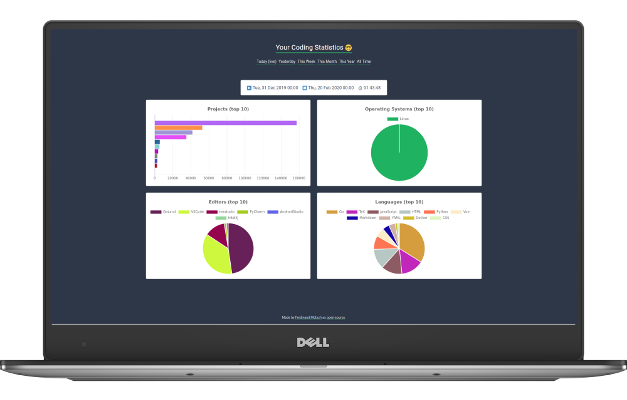📈 wakapi
A minimalist, self-hosted WakaTime-compatible backend for coding statistics
If you like this project, please consider supporting it 🙂. You can donate either through buying me a coffee or becoming a GitHub sponor. Every little donation is highly appreciated and boosts the developers' motivation to keep improving Wakapi!
Prerequisites
On the server side:
- Go > 1.13 (with
$GOPATHproperly set) - Optional: A MySQL- or Postgres database
On your local machine:
- WakaTime plugin for your editor / IDE
Server Setup
Run from source
- Enable Go module support:
export GO111MODULE=on - Get code:
go get github.com/muety/wakapi - Go to project root:
cd "$GOPATH/src/github.com/muety/wakapi" - Copy
.env.exampleto.envand set database credentials - Adapt
config.inito your needs - Build executable:
go build - Run server:
./wakapi
Run with Docker
docker run -d -p 3000:3000 --name wakapi n1try/wakapi
To get your API key, take a look into the logs docker logs wakapi | grep "API key"
In addition, you can specify several environment variables for configuration:
-e WAKAPI_DEFAULT_USER_NAME=admin-e WAKAPI_DEFAULT_USER_PASSWORD=admin
By default, SQLite is used as a database. To run Wakapi in Docker with MySQL or Postgres, see Dockerfile and .env.example for further options.
Client Setup
Wakapi relies on the open-source WakaTime client tools. In order to collect statistics to Wakapi, you need to set them up.
- Set up WakaTime for your specific IDE or editor. Please refer to the respective plugin guide
- Make your local WakaTime client talk to Wakapi by editing your local
~/.wakatime.cfgfile as follows
api_url = https://your.server:someport/api/heartbeat`
api_key = the_api_key_printed_to_the_console_after_starting_the_server`
Customization
User Accounts
- When starting wakapi for the first time, a default user admin with password admin is created. The corresponding API key is printed to the console.
- Additional users, at the moment, can be added only via SQL statements on your database, like this:
- Connect to your database server:
mysql -u yourusername -p -H your.hostname(alternatively use GUI tools like MySQL Workbench) - Select your database:
USE yourdatabasename; - Add the new user:
INSERT INTO users (id, password, api_key) VALUES ('your_nickname', MD5('your_password'), '728f084c-85e0-41de-aa2a-b6cc871200c1');(the latter value should be a random UUIDv4, as can be found in your~/.wakatime.cfg)
- Connect to your database server:
Aliases
There is an option to add aliases for project names, editors, operating systems and languages. For instance, if you want to map two projects – myapp-frontend and myapp-backend – two a common project name – myapp-web – in your statistics, you can add project aliases.
At the moment, this can only be done via raw database queries. See User Accounts section above on how to do such. For the above example, you would need to add two aliases, like this:
INSERT INTO aliases (type, user_id, key, value) VALUES (0, 'your_username', 'myapp-web', 'myapp-frontend')(analogously formyapp-backend)
Types
- Project ~ type 0
- Language ~ type 1
- Editor ~ type 2
- OS ~ type 3
NOTE: In order for the aliases to take effect for non-live statistics, you would either have to wait 24 hours for the cache to be invalidated or restart Wakapi.
Best Practices
It is recommended to use wakapi behind a reverse proxy, like Caddy or nginx to enable TLS encryption (HTTPS).
However, if you want to expose your wakapi instance to the public anyway, you need to set listen = 0.0.0.0 in config.ini
Important Note
This is not an alternative to using WakaTime. It is just a custom, non-commercial, self-hosted application to collect coding statistics using the already existing editor plugins provided by the WakaTime community. It was created for personal use only and with the purpose of keeping the sovereignity of your own data. However, if you like the official product, please support the authors and buy an official WakaTime subscription!
License
GPL-v3 @ Ferdinand Mütsch




